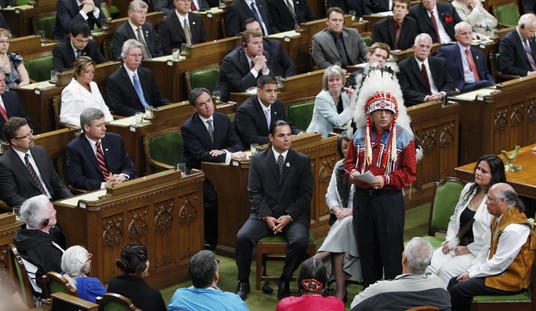During the run-up to the dramatic election just concluded, I was invited to attend an event to meet the Republican National Committee’s recently appointed director of faith engagement, Chad Connelly. In the course of his presentation that afternoon, Mr. Connelly remarked that he did not understand how anybody who believed in the principles of biblical morality could possibly vote for the Democrats, as presently constituted.
Precisely.
The American system of government is predicated upon the assumption that there is a civil society consisting primarily of self-disciplined, self-restrained people, adhering to a broadly agreed set of moral principles inculcated not through any act of government, but rather through private, religious institutions.
Though the Founding Fathers, prudently and shrewdly building on their experiences and knowledge of the English system, refused to establish any particular religion, they nonetheless recognized the vital nature of religion in ordering men’s affairs. For example, John Adams, the second president of the United States, said, “Our Constitution was made only for a Moral and Religious People. We have no government armed with power capable of contending with human passions unbridled by morality and religion.” Because such a government would be, inevitably, a totalitarian police state.
Mr. Adams was not the first to make this point. Some 1800 years ago, Rabbi Yehoshua ben Levi said: “The Torah says, ‘The Tablets were the work of G-d and the writing was the writing of G-d, engraved (haruth) upon the Tablets’; read not haruth but heruth (“freedom”), for none can be considered free except one who occupies himself with the study of Torah” (Avoth VI,2).
For there to be “a moral and religious people,” that people must be engaged in the active study of morality and religion.
The problem is that the civil society has changed under the relentless pressures of secularization, and not at all for the better. The Constitution’s original provision, enshrined in the First Amendment, that “Congress shall make no law respecting an establishment of religion or prohibiting the free exercise thereof” has been interpreted over the last 60 years in a fashion that bans any expression of religious faith in the public square and very greatly restricts the “free exercise thereof.” The rise of public education in government-funded and -managed schools has created an ever more secularized population.
One result, plainly visible to anyone with eyes to see and perspective stretching back half a century or more, has been a profound coarsening of the popular culture, a society so drenched in sex and sensuality that it is increasingly difficult to avoid images and scenes which were once relegated to shady venues in seedy neighborhoods, and openly termed indecent. The influence of this change on the general society can be read in the ever more bizarre headlines of crime reports, as well as in the somber statistics concerning out-of- wedlock births and their relationship to poverty and to those crime report headlines. With this change came a general cheapening of the value of human life, precisely at a time when modern medical science makes possible the survival of premature babies and the extension of those lives far beyond what was possible a generation ago.
The above facts have led the rapidly growing Orthodox Jewish community in the United States (the only part of the Jewish community which is growing, both through natural increase and also through very effective outreach efforts mounted by numerous groups and organizations) to face an array of agonizing choices. On the one hand, we have to live in this society, earn our livings in it, and interface with our non-Jewish neighbors. On the other hand, we want to protect our children from the corrosive and corrupting nature of the popular culture, and inculcate the values, attitudes, and outlook of a community striving for holiness, a community which greatly cherishes the way of our ancestors, and which is therefore deeply conservative.
The deep chasm between those values and what is routinely promoted in the popular culture leads many of us to a certain insularity. Few of us would own a television set, or attend a contemporary movie; many have very heavy filters on internet connections to home computers, or eschew computers in the home altogether, however indispensable they may have become for business. Many will not own a smart phone for the same reasons, and our educational institutions increasingly have to place sharp limitations on usage by those who do. Even the children’s sections of local public libraries are no longer safe, and few of us allow general, mass-circulation publications to enter our homes either.
One comment heard repeatedly during the 2012 election campaign was that Mitt Romney seemed a bit unreal in his deportment and manners, as though he had just stepped out of a time capsule from the 1950s. In many ways, that is true of my community as well.









Join the conversation as a VIP Member